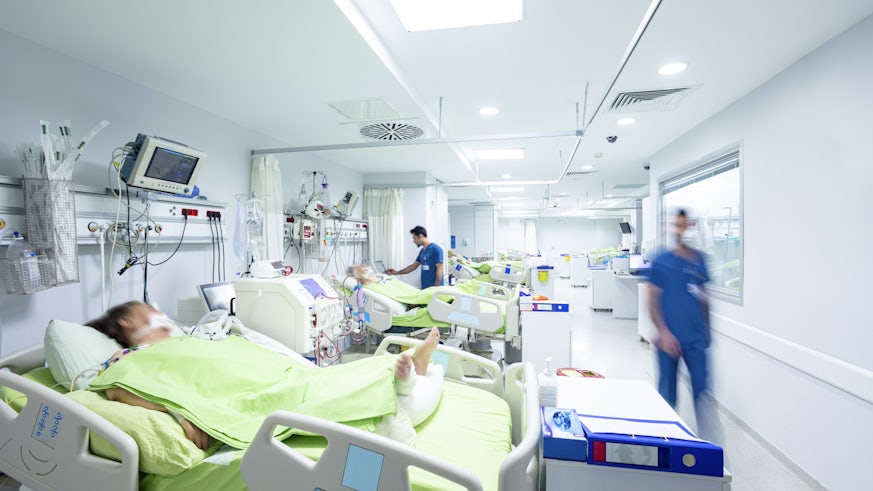Frailty is as important as age or underlying health issues in COVID-19 death risk, study finds
30 June 2020

Frailty is as important as either age or underlying health issues in determining whether someone may die from COVID-19, a new study has found.
The analysis of 1,564 hospital patients at 10 sites in the UK and one in Italy by specialists in geriatric care suggests increasing frailty is linked to a higher risk of death and longer time spent in hospital.
The study, published today in The Lancet Public Health, was carried out by researchers from Cardiff University, King’s College London, Salford Royal and North Bristol NHS trusts, among others, and is the first to explore the impact of frailty on death risk in the current pandemic.
The researchers said their findings showed frailty assessment was crucial to inform clinical decisions in COVID-19 treatment – and urged its use as a key indicator to assess a patient’s risk of dying.
Chief investigator and lead author Dr Jonathan Hewitt, from Cardiff University’s School of Medicine, said: “NICE guidelines put in place in March already recommend using frailty to assess COVID-19 patients – but we don’t know how much this is being used in practice.
“Our study shows it is vital to frontline care; every COVID-19 patient should be assessed for frailty because we now know that being frail – no matter how old you are or what underlying conditions you may have – affects your chance of recovery from this disease."
Up until now the focus has been on age and other health issues but we believe this should now shift to frailty to make sure patients are receiving the appropriate, targeted treatment.
Frailty is a clinical condition signified by a loss of reserves, energy and wellbeing that leaves people vulnerable to sudden changes in health and at risk of hospital admission, the need for long-term care or death.
Senior author Dr Kathryn McCarthy, a surgeon from North Bristol NHS Trust who researches frailty, said: “Greater awareness is needed around the concept of frailty and its use as a tool for assessment, both within hospitals and in the community.
“Frailty assessment is quick and easy, and training to carry it out is simple. It could be routinely carried out by GPs or geriatricians in primary care, or even in care homes, allowing this information to be at hand on admission to hospital.
“Our findings may also adjust people’s understanding of their own personal risk from COVID-19. For example, younger people can be frail and higher risk but are told they are in a lower risk group, while older people who are not frail have been told they are at risk and need to shield just because of their age.
“If people believe they may fall into the high frailty category they should engage with their GP, as they are at higher risk of dying from COVID-19 if they become infected. Once assessed as frail there are many preventative measures that can be taken to decrease frailty, particularly around exercise.”
The aim of the COPE (COVID-19 in Older People) study was to establish the prevalence of frailty in COVID-19 patients – and investigate its influence on mortality and length of hospital stay.
Of 1,564 people admitted with COVID-19, two thirds were aged 65 and over. Not all of the older group were assessed to be frail, with 65% of those who were 65-plus falling into this category, while 20% of those aged under 65 were deemed to be frail.
Further analysis showed that patients who were considered to be severely frail were 2.4 times more likely to die from COVID-19 than those who weren’t assessed as frail, after accounting for age, other health problems and the severity of illness when patients were admitted to hospital.
Dr Ben Carter, lead epidemiologist on the study from the Institute of Psychiatry, Psychology & Neuroscience, King’s College London, who co-ordinated the research, said: “Our study showed there was a 2.4 times increase in hospital mortality amongst the most frail compared to the least frail after accounting for age, other health conditions and severity of illness on admission.
“We need to think of frailty as being just as important as age or underlying health conditions when it comes to treating COVID-19 and we should now look at ways to help reduce frailty in the general population as a protective measure.”
Dr Carter continued: “With the measures in shielding being relaxed in coming months and the ongoing possibility of a second wave of COVID-19 it will be important to have a meaningful indicator to help inform decisions as to who may have to shield again.
“In this study we have shown the value of frailty in assessing the risk of death from COVID-19 and believe that it could provide helpful insight into if and when people may have to shield again in the future.”
The research was a collaboration between Cardiff University, North Bristol NHS trust, King’s College London, Aberdeen and Glasgow universities and the University of Modena and Reggio Emilia, and included patients from Cardiff and Vale University Health Board, Aneurin Bevan University Health Board, North Bristol NHS Trust, Salford Royal NHS Foundation Trust, NHS Greater Glasgow and Clyde, NHS Grampian and the University Hospital of Modena Policlinico.
The researchers said further work was needed to understand whether comprehensive geriatric care, physical activity and optimum nutrition could improve outcomes for frail patients with the disease.
Share this story
The School is a major international centre for teaching and research, and committed to the pursuit of improved human health.




